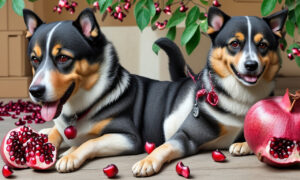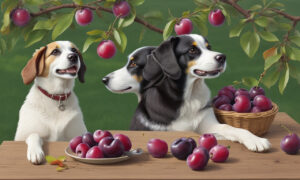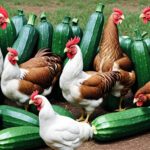Chickens are not just livestock; they’re a part of the family for many backyard farmers and poultry enthusiasts. As with any pet or animal under your care, knowing what foods to feed them is crucial for their health and happiness. One common question that pops up among chicken owners is, "Can chickens have grapes?" This seemingly simple inquiry opens up a broader discussion about the dietary preferences and restrictions for chickens. In this engaging read, we’ll dive deep into the world of chickens and grapes, providing you with all the information you need to ensure your feathered friends are clucking with joy. Prepare to unlock the secret snacks for your coop with our comprehensive guide.
Understanding Your Chicken’s Diet: A Prelude to Grapes
Before we launch into the specifics of chickens and grapes, it’s important to lay the groundwork. Chickens are omnivores, meaning they can eat a variety of foods, including grains, insects, and even small animals. However, just because chickens can eat something, doesn’t mean they should.
The Basics of a Balanced Chicken Diet
A well-balanced diet for chickens should include:
- Grains and seeds: The staple of their diet, usually found in quality commercial feeds.
- Greens: Leafy vegetables and herbs contribute to their nutrient intake.
- Proteins: Essential for growth and egg production, typically from insects or meat scraps.
- Calcium: Crucial for strong eggshells, often sourced from oyster shells or similar.
Grains are the key players in providing energy through carbohydrates while proteins help in tissue development and maintenance.
Can Grapes Be Part of This Balanced Diet?
Now the question arises, can grapes fit into this dietary jigsaw puzzle for chickens? The answer is, yes, chickens can have grapes. Grapes are a good source of vitamins, minerals, and antioxidants that can supplement a chicken’s diet. However, they should be given in moderation. Think of grapes as a treat — a delicious snack that your chickens will peck at with delight, but one that shouldn’t replace their primary food source.
The Grape Debate: Are Grapes Safe for Chickens?
Many chicken owners out there are keen but cautious when it comes to feeding their flock new foods. So, let’s shed some light on the safety concerns around chickens and grapes.
Identifying Potential Risks
Despite grapes being a safe treat, there are a few risks to be aware of:
- Choking hazard: Particularly for small chickens or chicks, large grapes pose a risk.
- Pesticides: Non-organic grapes may carry harmful chemicals.
- Overconsumption: Too many grapes can lead to digestive issues or nutritional imbalances.
Addressing the Safety Concerns
To mitigate these risks:
- Size Matters: Always cut grapes in half or quarters to prevent choking.
- Go Organic: Opt for organic grapes to avoid exposing your chickens to pesticides.
- Moderation is Key: Limit grape intake to avoid upsetting their diet’s balance.
Serving Grapes to Your Chickens: Best Practices
With safety considerations out of the way, let’s discuss how to best serve grapes to your chickens for optimal enjoyment and health benefits.
How Often and How Much?
Grapes should only be a small part of your chicken’s diet — think of them as an occasional treat rather than a regular menu item. A good rule of thumb is to feed only what they can finish within 15 minutes, ensuring they get back to their regular feed.
Creative Ways to Feed Grapes to Your Flock
Make feeding time fun with these tips:
- Hang bunches of grapes: This provides exercise and entertainment as they jump to peck at them.
- Frozen grapes: A refreshing summer snack that helps them cool down.
- Mixed with other treats: Combine grapes with other safe fruits and vegetables for variety.
The Nutritional Profile of Grapes: Unveiling the Benefits
Grapes offer more than just a sweet taste; they come packed with nutrients that can be a boon for your chickens’ health.
Vitamins and Minerals Galore
Here’s what’s in a grape:
- Vitamin C: Supports the immune system.
- Vitamin K: Essential for blood clotting and bone health.
- Potassium: Regulates fluid balance and muscle function.
- Antioxidants: Combat oxidative stress and may improve overall health.
Understanding the Sugar Content
Though grapes are healthy, they do contain natural sugars. Too much sugar can lead to weight gain and other issues in chickens. That’s why it’s crucial to offer grapes in moderation alongside a well-rounded diet.
Beyond Grapes: Other Safe Snacks for Chickens
Now that we’ve established that chickens can enjoy grapes, what other snacks can you safely introduce to their diet?
Fruit & Vegetable Treats Your Chickens Will Love
- Apples (sans seeds)
- Berries of all kinds
- Carrots (cooked or raw)
- Cucumbers
- Pumpkin and squash
These snacks are not only nutritious but also provide an enriching experience as chickens peck and forage.
Foods to Avoid: The No-No List
Keep your chickens away from:
- Avocado: The pit and skin contain persin, which is toxic to chickens.
- Chocolate: Contains theobromine and caffeine, which can be harmful.
- Onions: Can cause anemia or respiratory issues in large quantities.
Feeding Grapes to Chicks: Extra Caution Required
When it comes to chicks, the guidelines for feeding grapes are stricter. Due to their tiny size, the risk of choking is higher. If you decide to treat your chicks to grapes, ensure they are chopped into very small pieces and offered sparingly.
Building Healthy Eating Habits from the Start
Introducing treats like grapes early on must be balanced with establishing a foundation of quality starter feed. Chicks require the proper nutrients for rapid growth and development. Treats should never come at the expense of their primary nutritional needs.
Common Questions on Chickens and Grapes Answered
It’s natural to have inquiries as you navigate the do’s and don’ts of chicken care. Let’s tackle a few common questions:
Can Chickens Eat Grapevines or Leaves?
Yes, chickens can eat grapevines and leaves; they are non-toxic and provide a good source of foraging material. However, this should be supervised to ensure they don’t overindulge.
What About Raisins?
Raisins, which are dried grapes, are also safe for chickens but they are more concentrated in sugar content, so they should be given even more sparingly.
Can Grapes Affect Egg Production?
There is no direct link between feeding grapes and egg production. However, maintaining a balanced diet is key to ensuring your hens lay eggs regularly. Treats should not displace their primary feed, which is designed to support optimal egg production.
The Verdict: Can Chickens Have Grapes?
In conclusion, grapes can be a healthy treat for your chickens when offered responsibly. This delicacy should be doled out in moderation, always ensuring that it supplements a nutritionally-complete feed. With the right precautions and serving sizes, you can enjoy watching your chickens indulge in grapes while knowing you’re providing a nutrient-rich snack.
Remember, a happy chicken means a happy coop, and with this guide, you’re well-equipped to bring joy and nutrition to your feathered friends. Now go ahead and share those grapes — just not too many!






